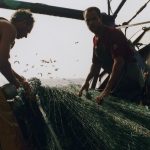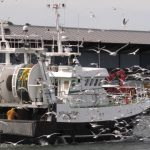According to the organization Atlantic mackerel has been certified as sustainable on January 2009 and got MSC status. Scottish Pelagic Sustainability Group Ltd said that species mackerel (Scomber scombrus) from the location ICES divisions VI, VII, and VIIIabc has given the MSC certificate as sustainable. The fishing method used for this fishery is mid-water trawl and the vessels are 21 Scottish owned and operated large RSW (refrigerated seawater) pelagic mid-water trawl vessels.
It is told that mackerel is a pelagic fish spending most of its time in mid-water travelling in large dense, shoals, often at great speed and making very long migrations. According to the information the species is a voracious, opportunistic feeder and feeds mainly on zooplankton, but also on some small pelagic fish. As a result it is a very oily fish, building up high energy reserves during the spring and summer which it needs both for migration and subsequent gonad development during the following winter.
The vessels used in this fishing method are modern and technologically advanced with on-going investment in state of the art technology. Modern electronic equipment such as sonar, net and catch monitors has greatly improved the precision of this method of fishing. It is noted that pelagic trawls are towed at the appropriate level in the water column to intercept target shoals, with gear depth being controlled by altering towing speed and/or warp length.
The mid-water trawl used by the Scottish pelagic fleet is designed and rigged to fish in midwater, including in the surface water. The large net (considerably larger than a demersal trawl net) consists of a cone shaped body, ending in a codend with lateral wings extending forward from the opening. The commercial market is said that landings from the Scottish pelagic vessels that fish the Western mackerel fishery are used entirely for human consumption.








